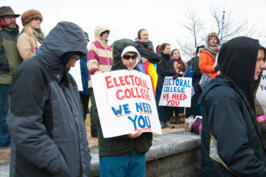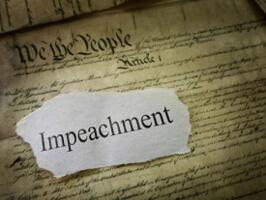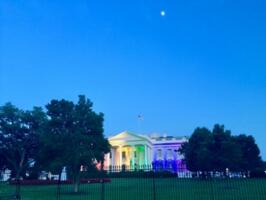Opposition Grows to Scrapping Electoral College
Most Americans still understand the reason the Founding Fathers established the Electoral College and are increasingly opposed to efforts to get rid of it.

Most Americans still understand the reason the Founding Fathers established the Electoral College and are increasingly opposed to efforts to get rid of it.

Voters feel good about the U.S. Postal Service but aren’t sure they want to expand its job description to include banking services as prominent Democrats are proposing.

Voters tend to agree with Senator Bernie Sanders that America will be in big trouble very soon if it doesn’t aggressively tackle climate change, even though they question the integrity of politicians who champion the issue.

Few voters think it’s too hard to get an abortion in America today, but several states are moving to make it harder. Voters still tend to think abortion policy should be set at the federal level, however.

Voters continue to believe the U.S. immigration system is broken and still tend to favor shifting to the skills-based system that President Trump is proposing.

Repairing America’s infrastructure may be the only thing President Trump and congressional Democrats can agree on, but Americans aren’t nearly as worried about the country’s roads and bridges these days. They’re still not overly enthusiastic about paying for any repairs anyway.

Voters continue to say that illegal immigration is the most pressing issue for Congress, but they also still have very little confidence that President Trump and congressional Democrats can get anything done.

While the Trump administration works to shift U.S. visa policy to a merit-based system rather than a family-based one, most voters continue to favor a crackdown on those who overstay their welcome.

As tensions escalate with Iran over its nuclear weapons program, voters here are more supportive of President Trump’s get-tough attitude but are not optimistic that it will bring needed change.

Voters continue to strongly oppose government benefits and constitutional legal rights for those here illegally and think the availability of those things is a magnet for further illegal immigration.

Congressional Democrats seem to be in an impeaching mood these days, but voters think their threats against President Trump, Attorney General William Barr and U.S. Supreme Court Justice Brett Kavanaugh are going nowhere.

Democrats remain convinced that President Obama is largely responsible for the economic boom that followed Donald Trump’s election, but voters in general agree that Trump’s impeachment would be bad news for the U.S. economy.

President Trump has announced that he is tightening up the process for foreigners seeking asylum in the United States to shift resources to the borders. Voters agree the asylum process needs work and that the borders need help.

Hillary Clinton’s back in the news, claiming once again that she was robbed in the 2016 election and that President Trump should be impeached. But voters don’t see a Hillary Clinton presidency as a better deal for them.

Voters think Special Counsel Robert Mueller’s report is unlikely to help congressional Democrats impeach President Trump, but they expect reporters to try to hurt the president with it if they can.

Voters still aren’t eager to live in so-called sanctuary communities, and they tend to support President Trump’s proposal to send illegal immigrants to those communities.

A sizable number of voters don’t agree with the findings of Special Counsel Robert Mueller’s report, although many of them are not exactly sure why. Most voters think politics is the reason for the criticism.

A prominent Democratic congresswoman has called for cutting U.S. military aid to Israel following the reelection of the “Trump-like” Benjamin Netanyahu as prime minister. But voters here don’t appear ready to do that.

Pete Buttigieg, the little-known Democratic mayor of South Bend, Indiana, is hoping to be the first openly gay presidential nominee of a major party. Most voters are willing to support a gay president, but they’re far less confident that others close to them feel the same way.

A Muslim congresswoman has drawn criticism for recent comments that appeared to downplay the terrorist attacks on September 11, 2001, but voters are closely divided over whether Americans even remember that horrific day. One-in-three can’t say how many died in those attacks.